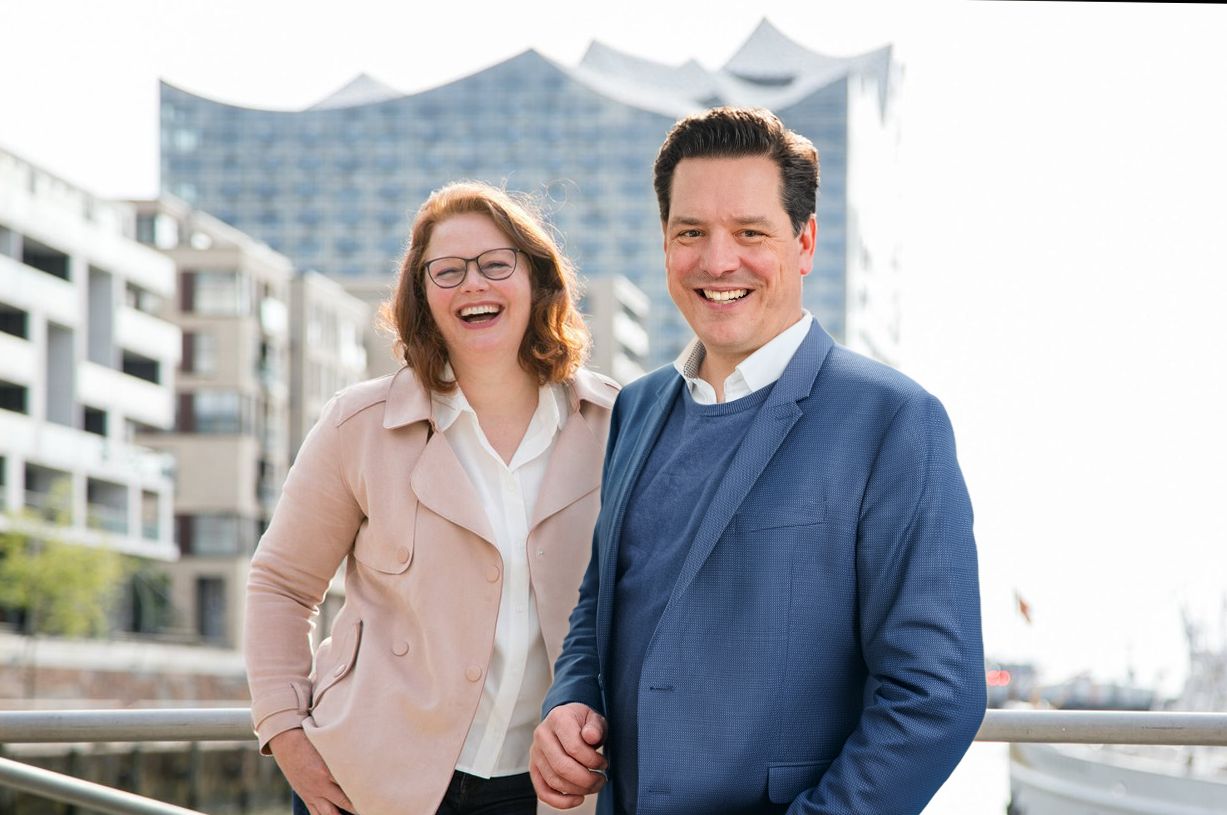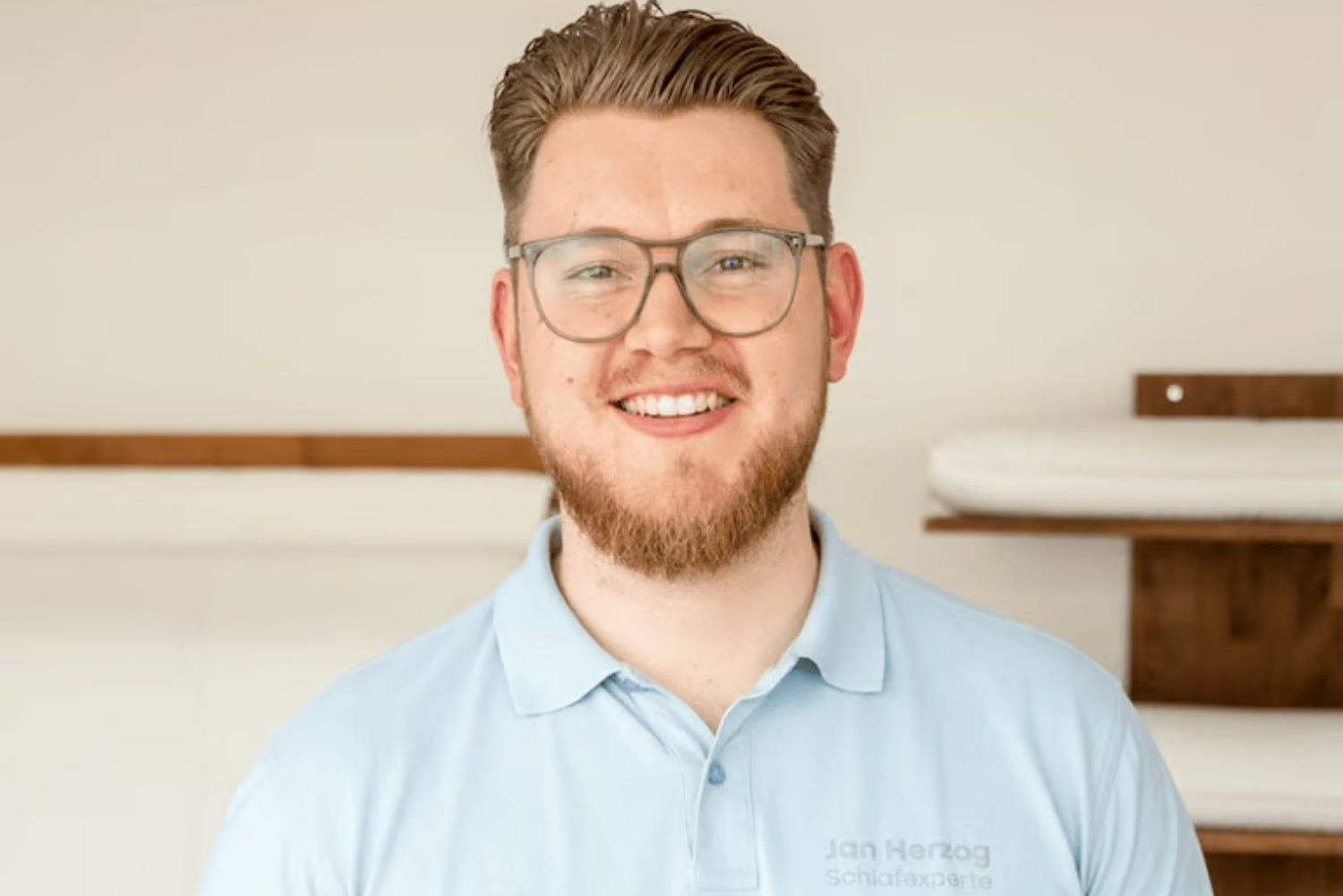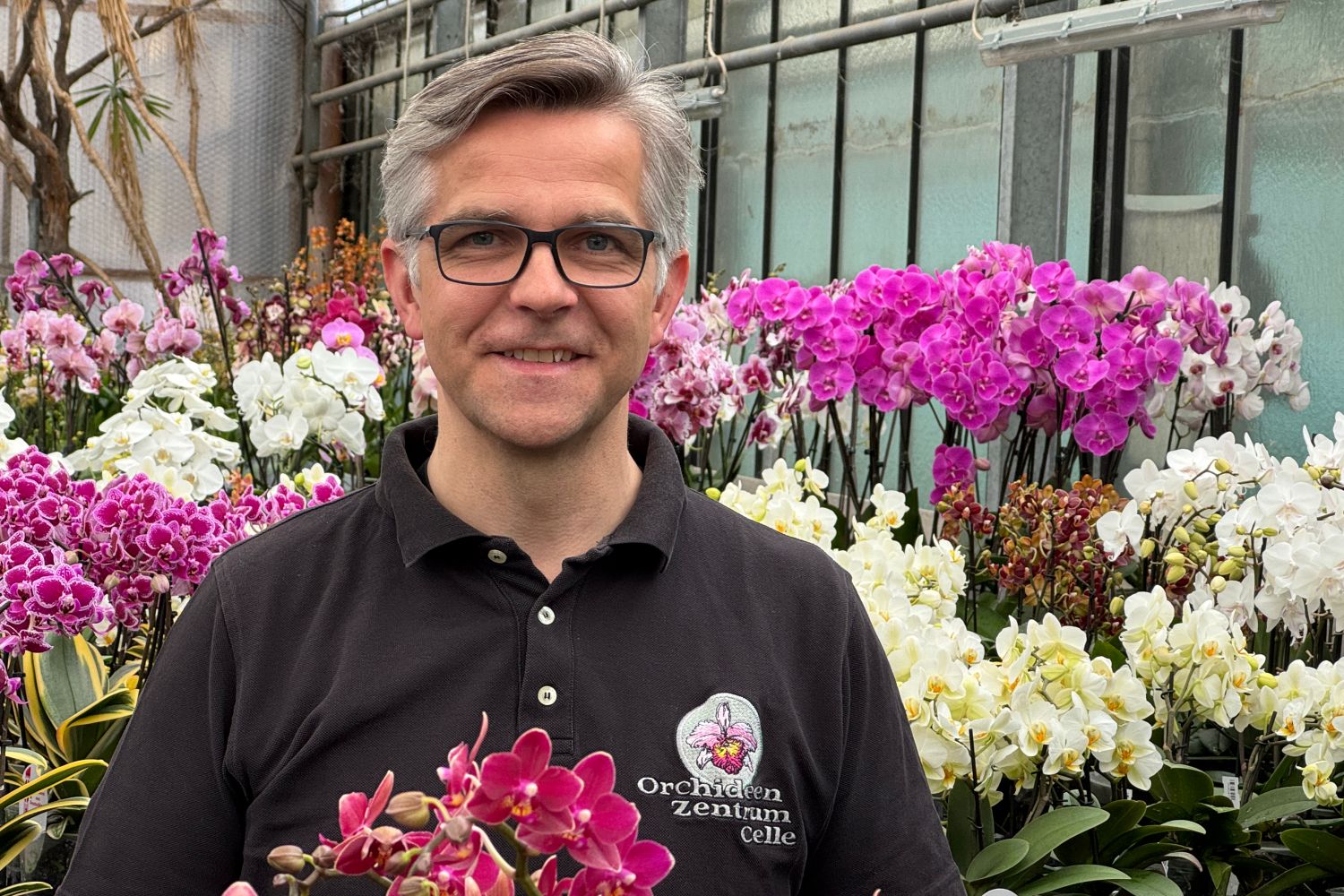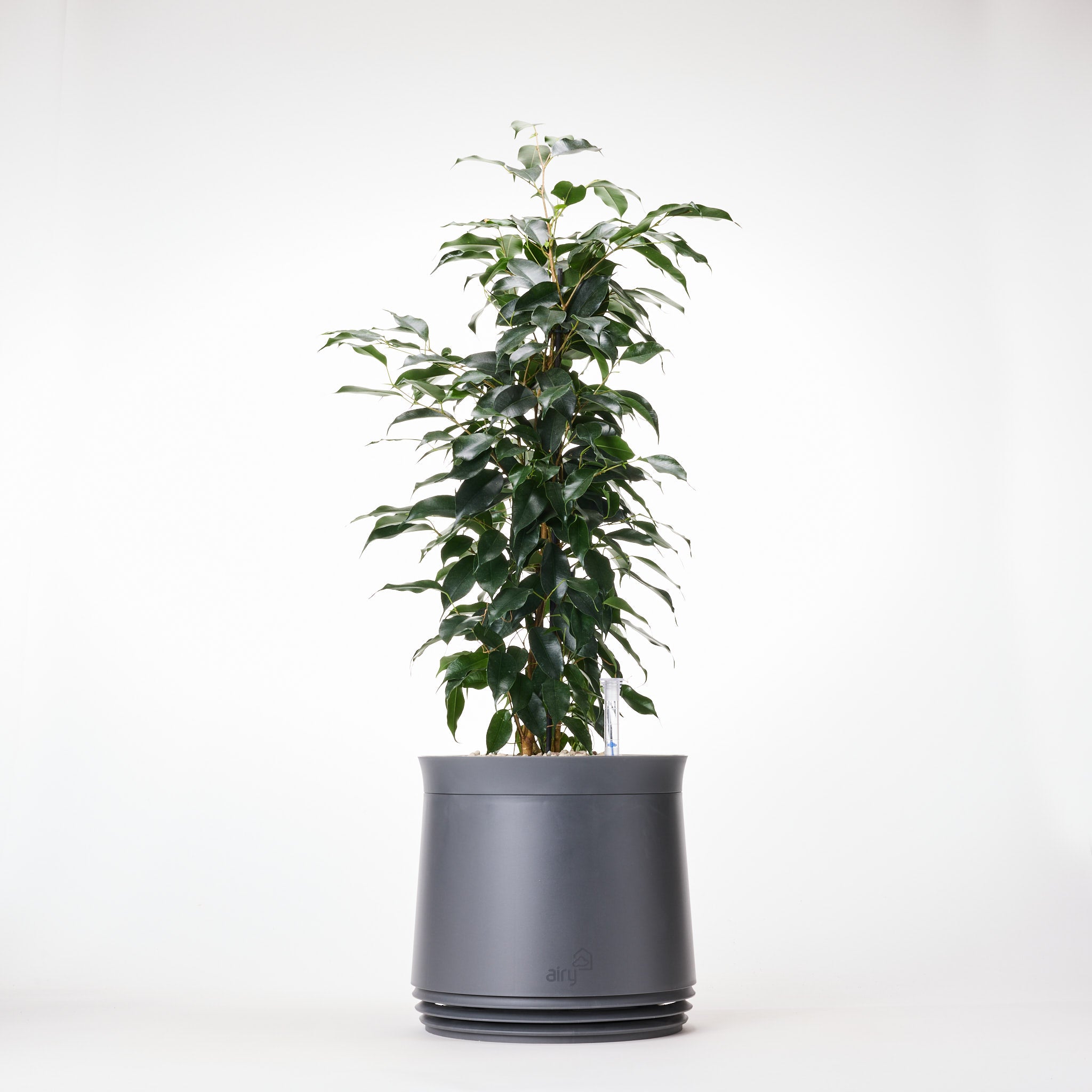
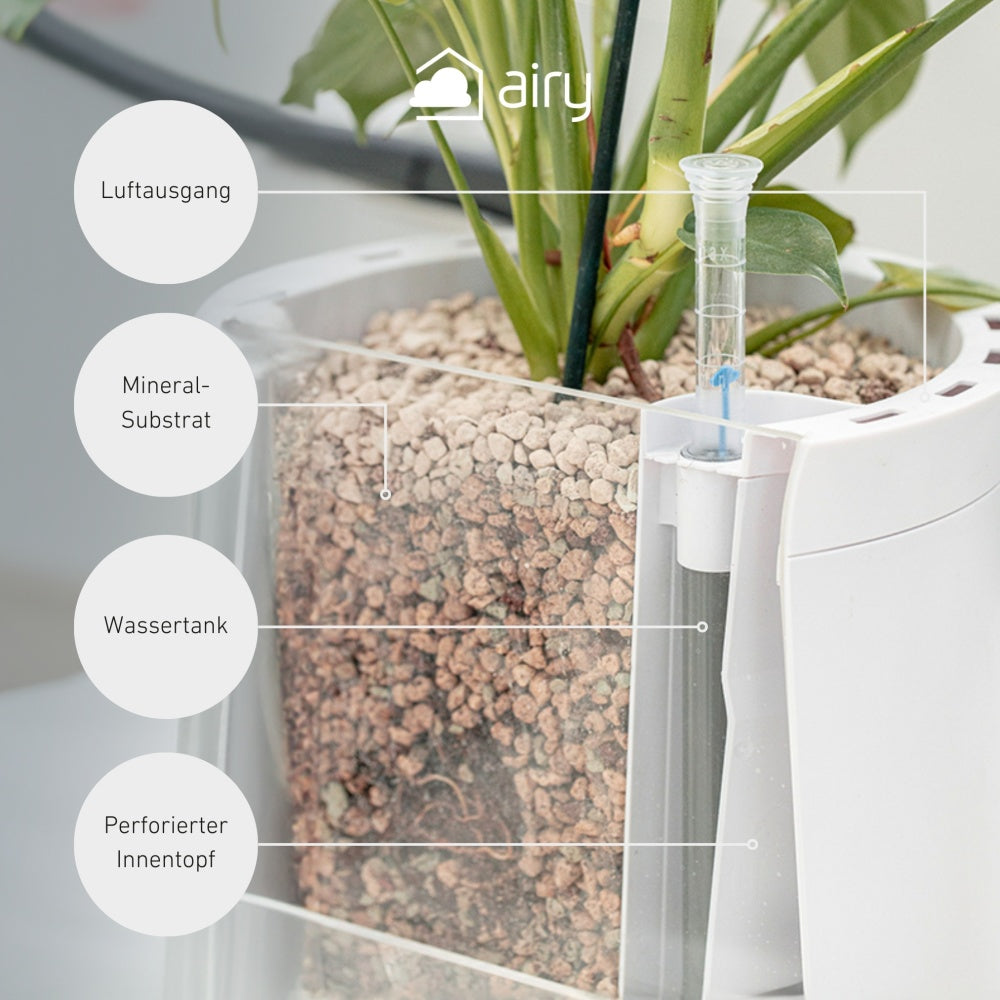
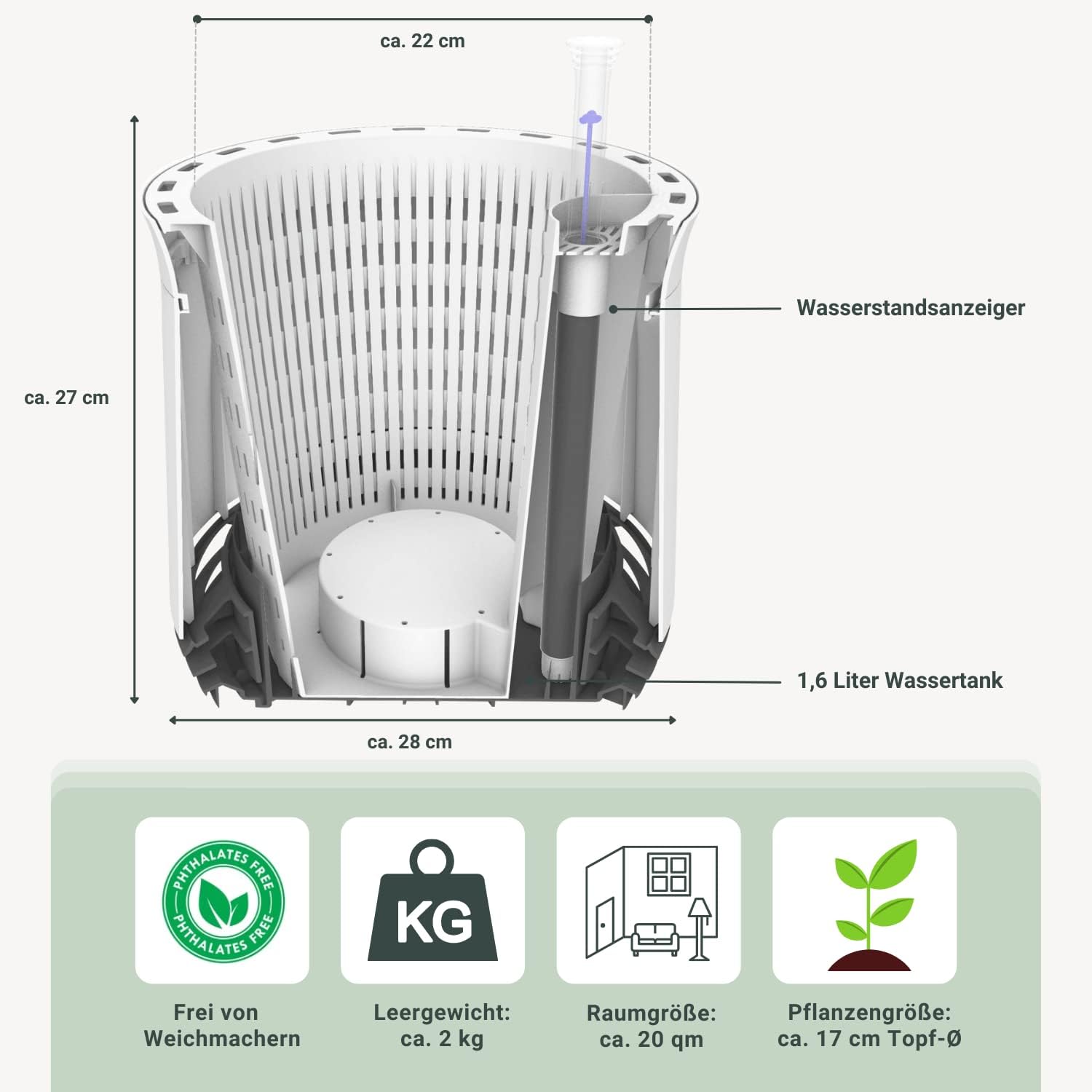
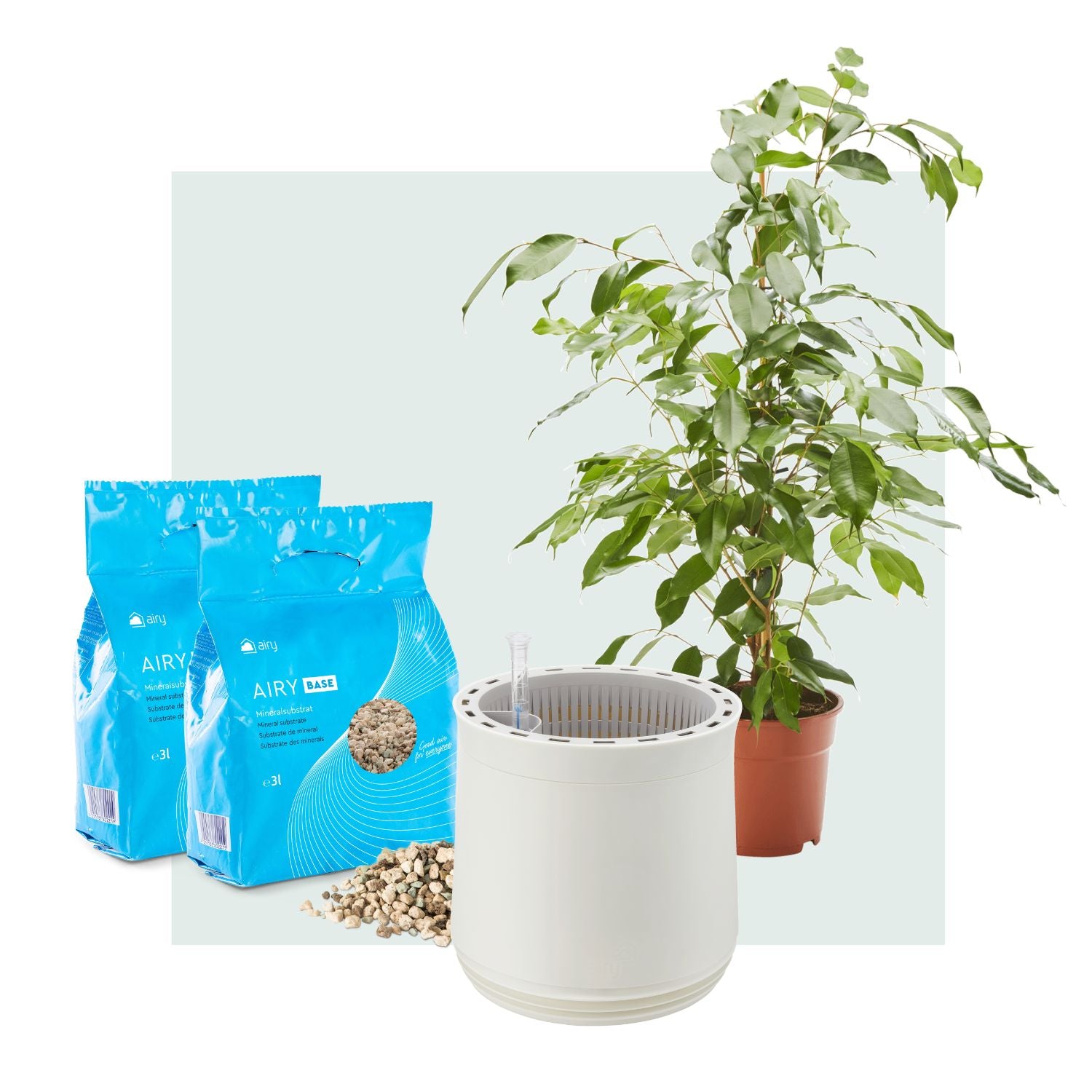
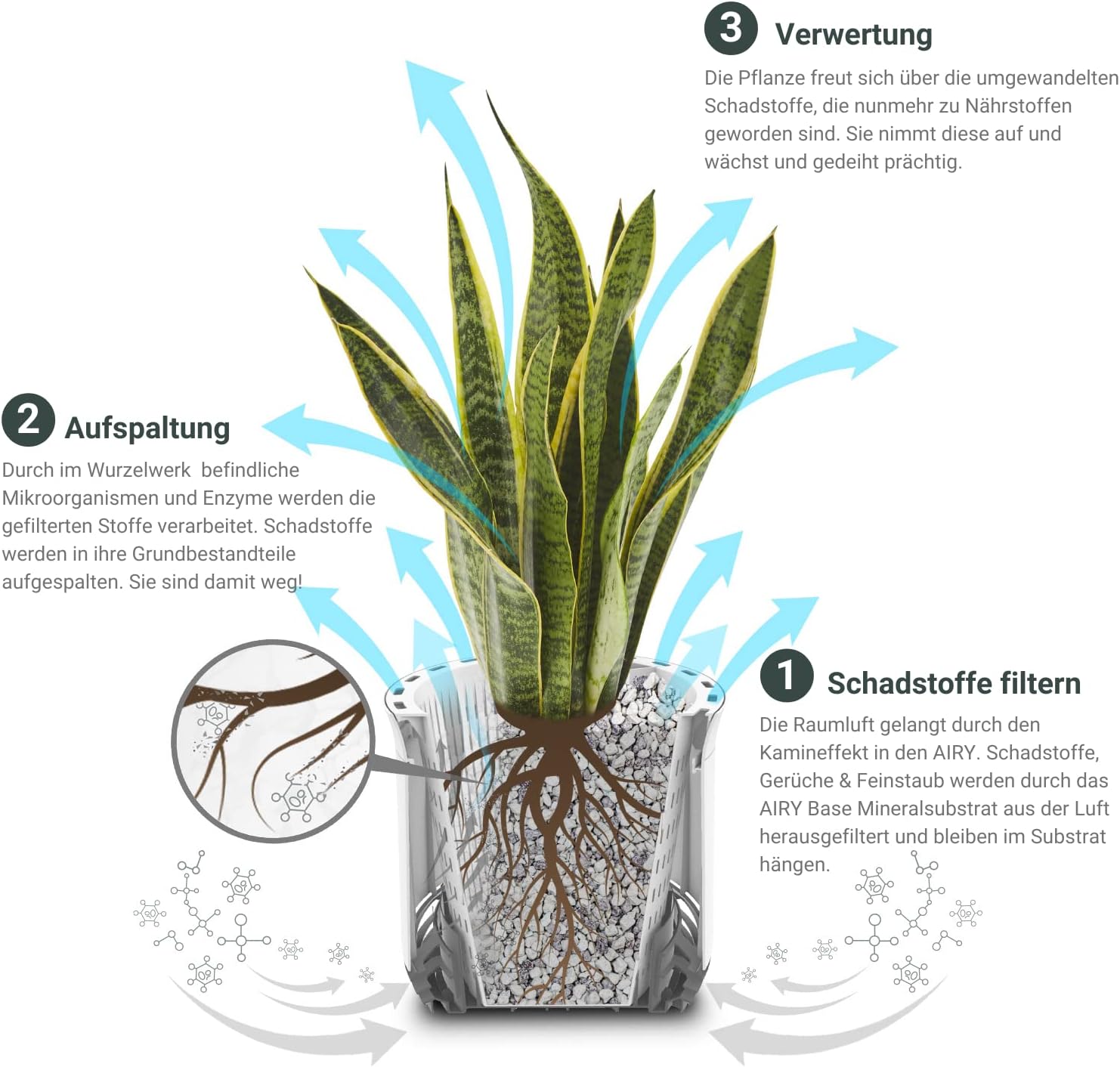
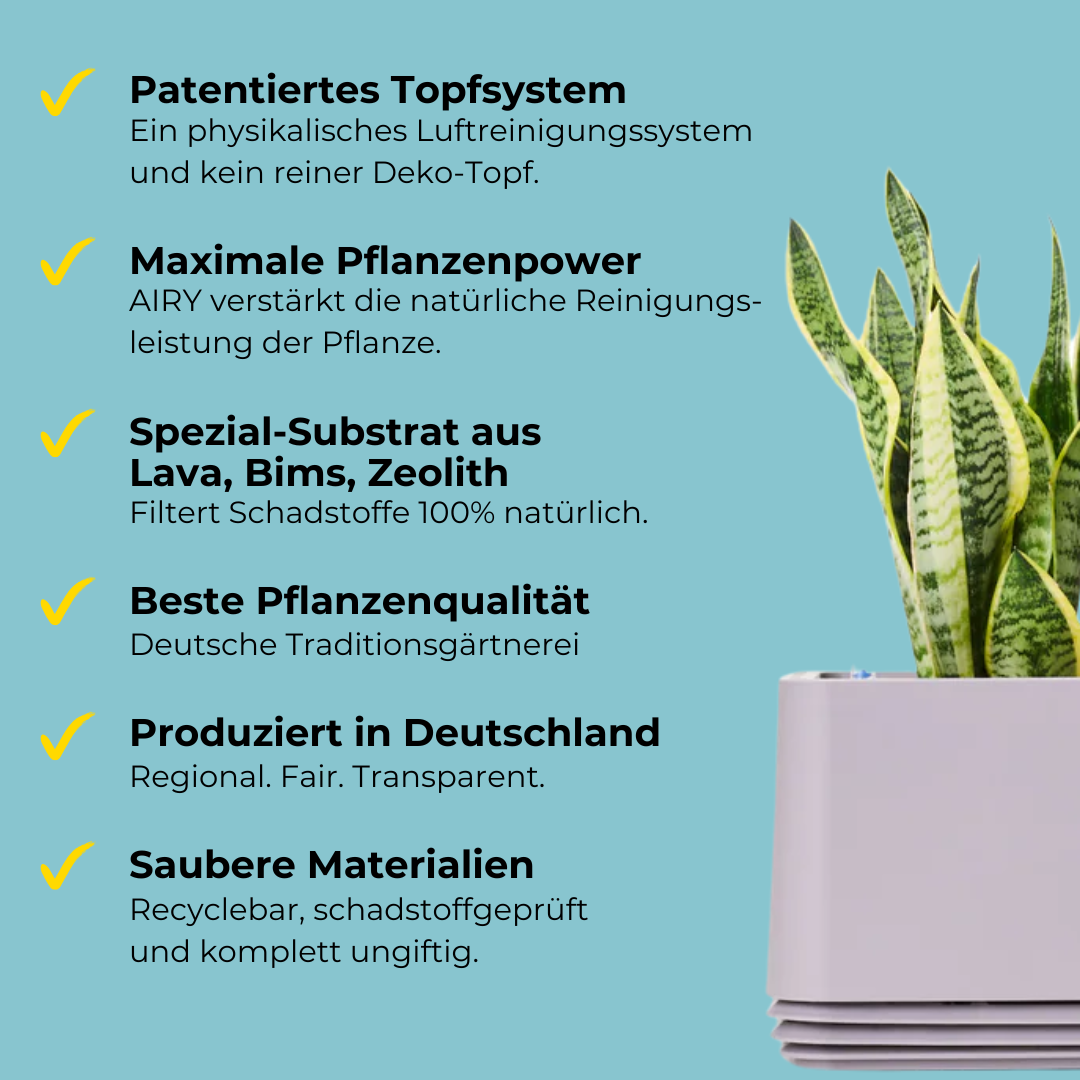

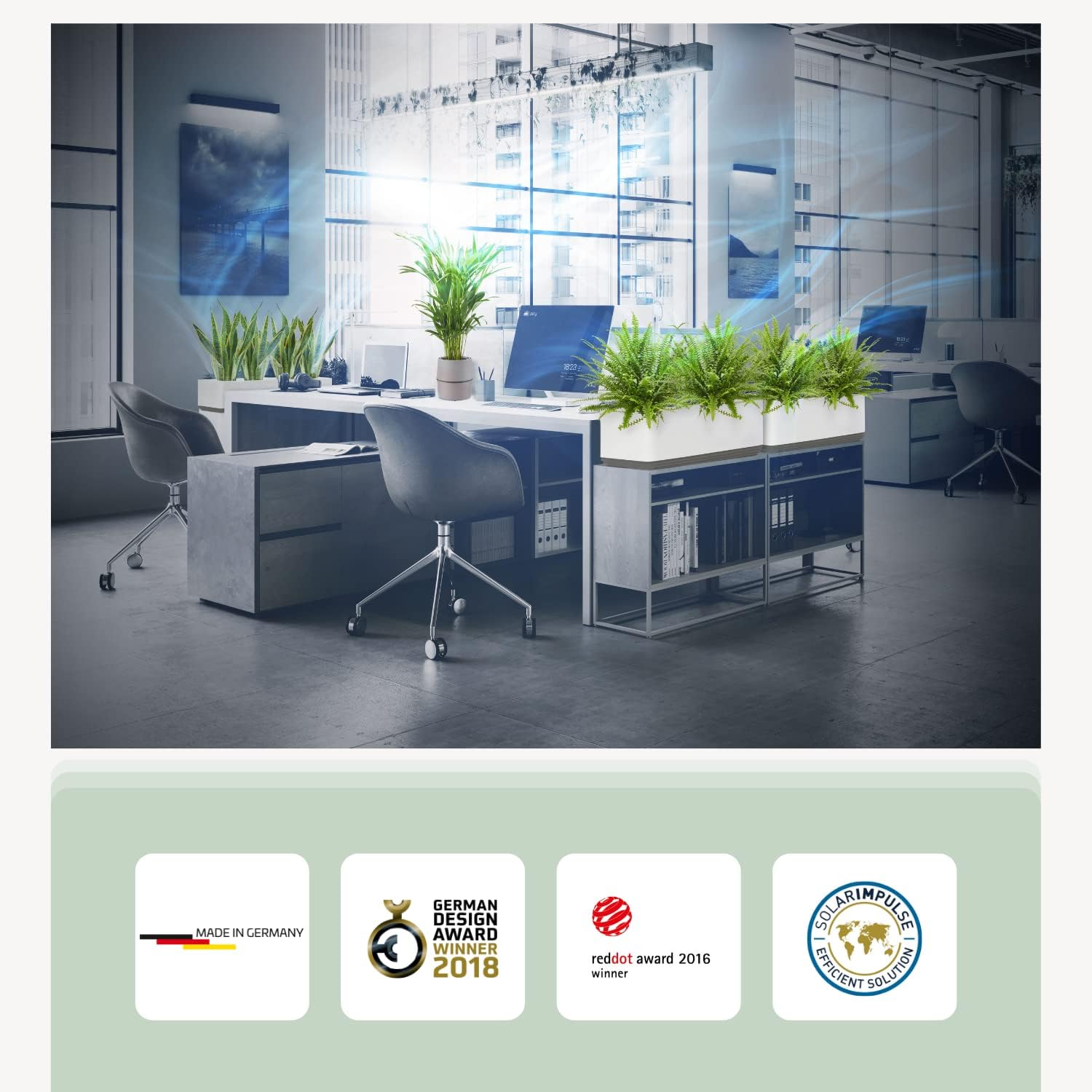
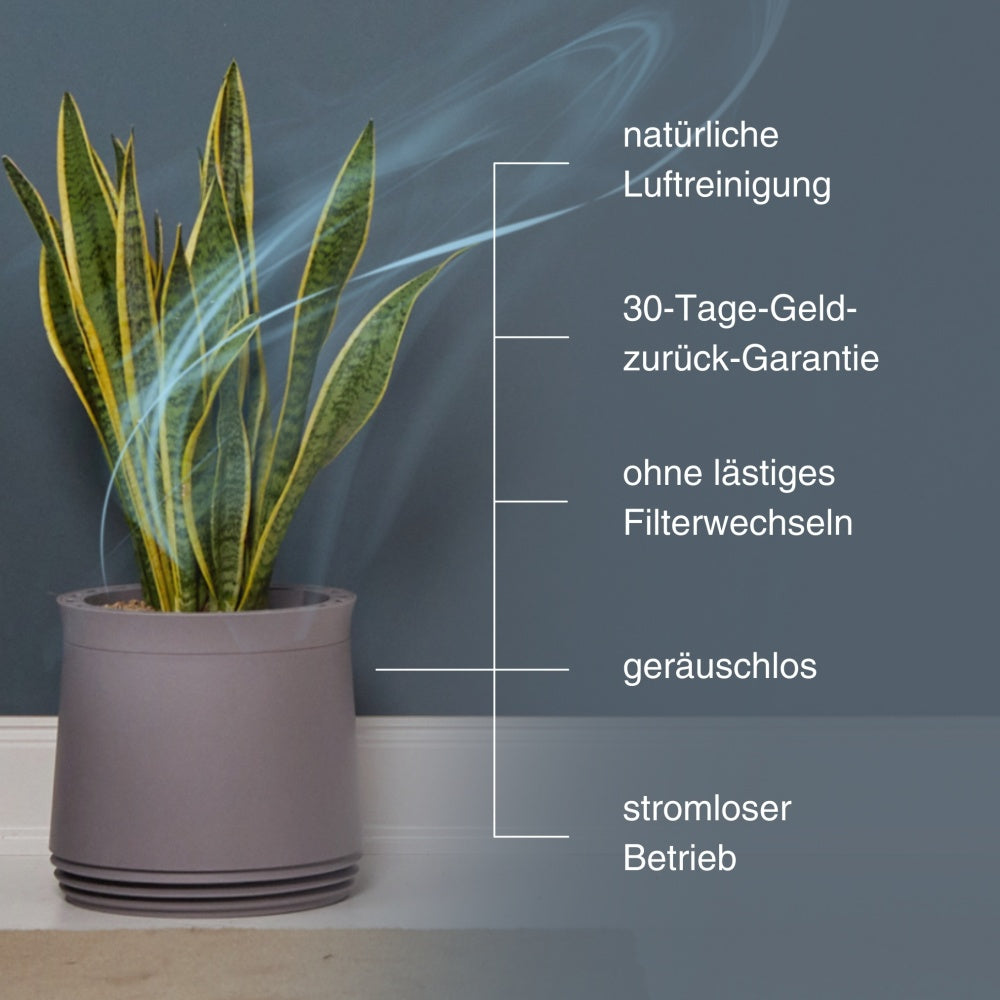
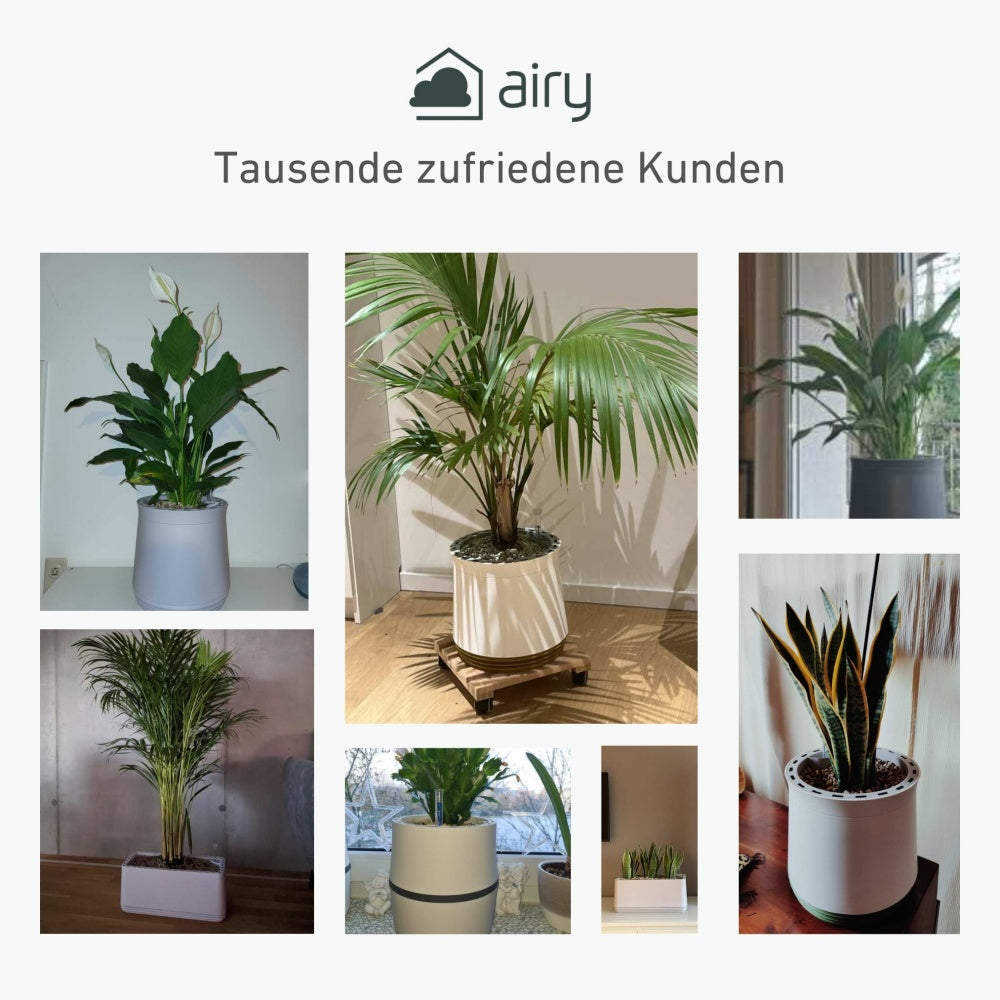
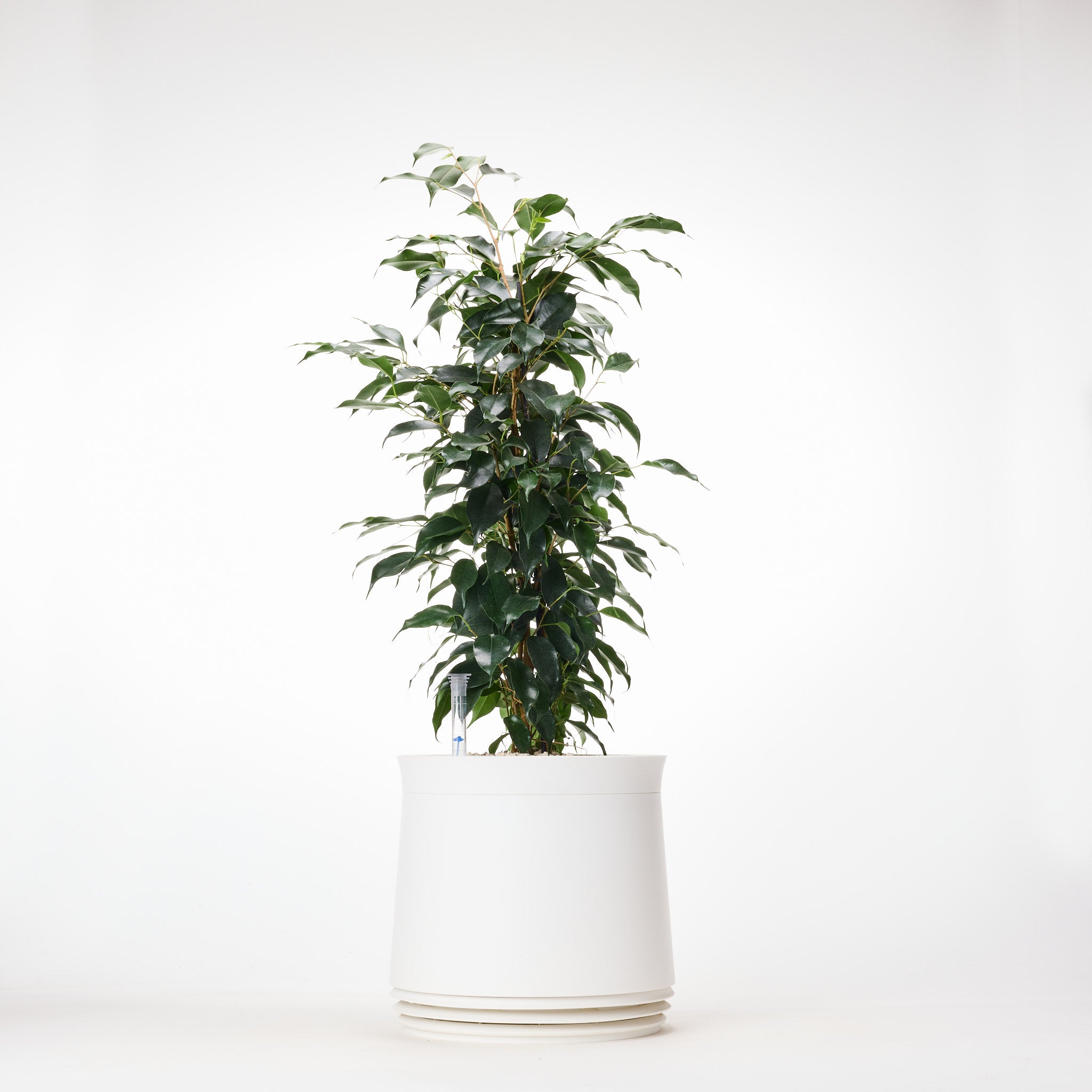
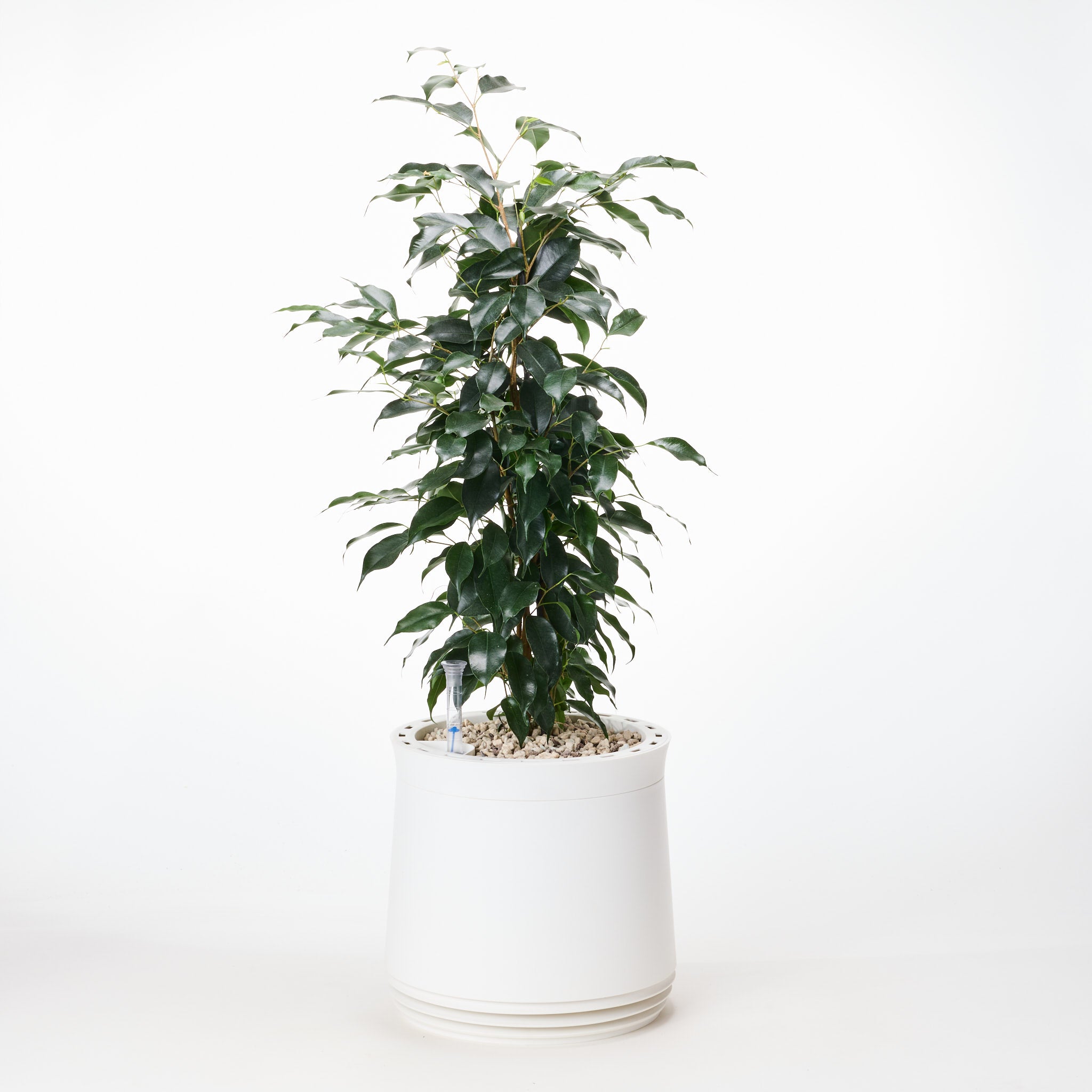
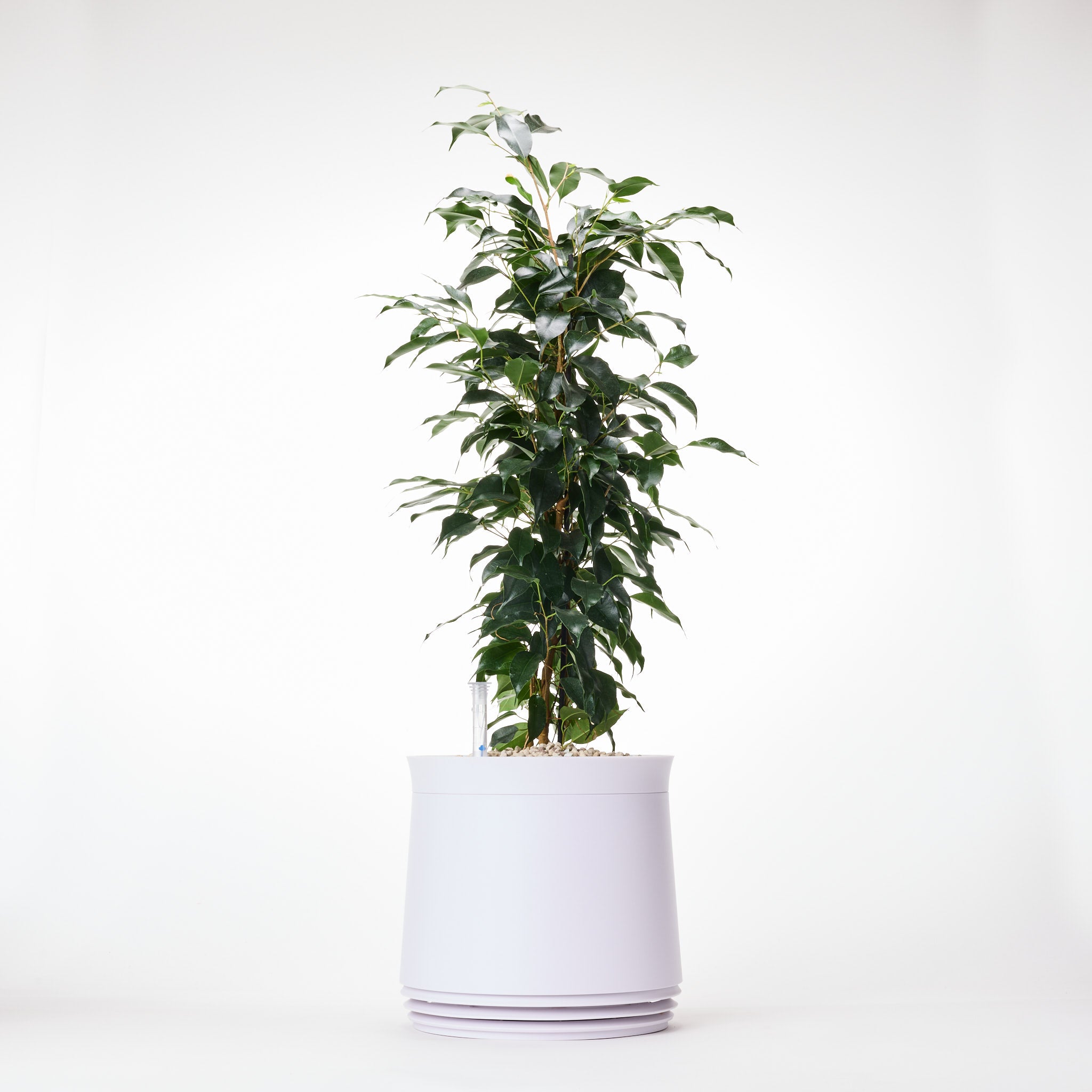
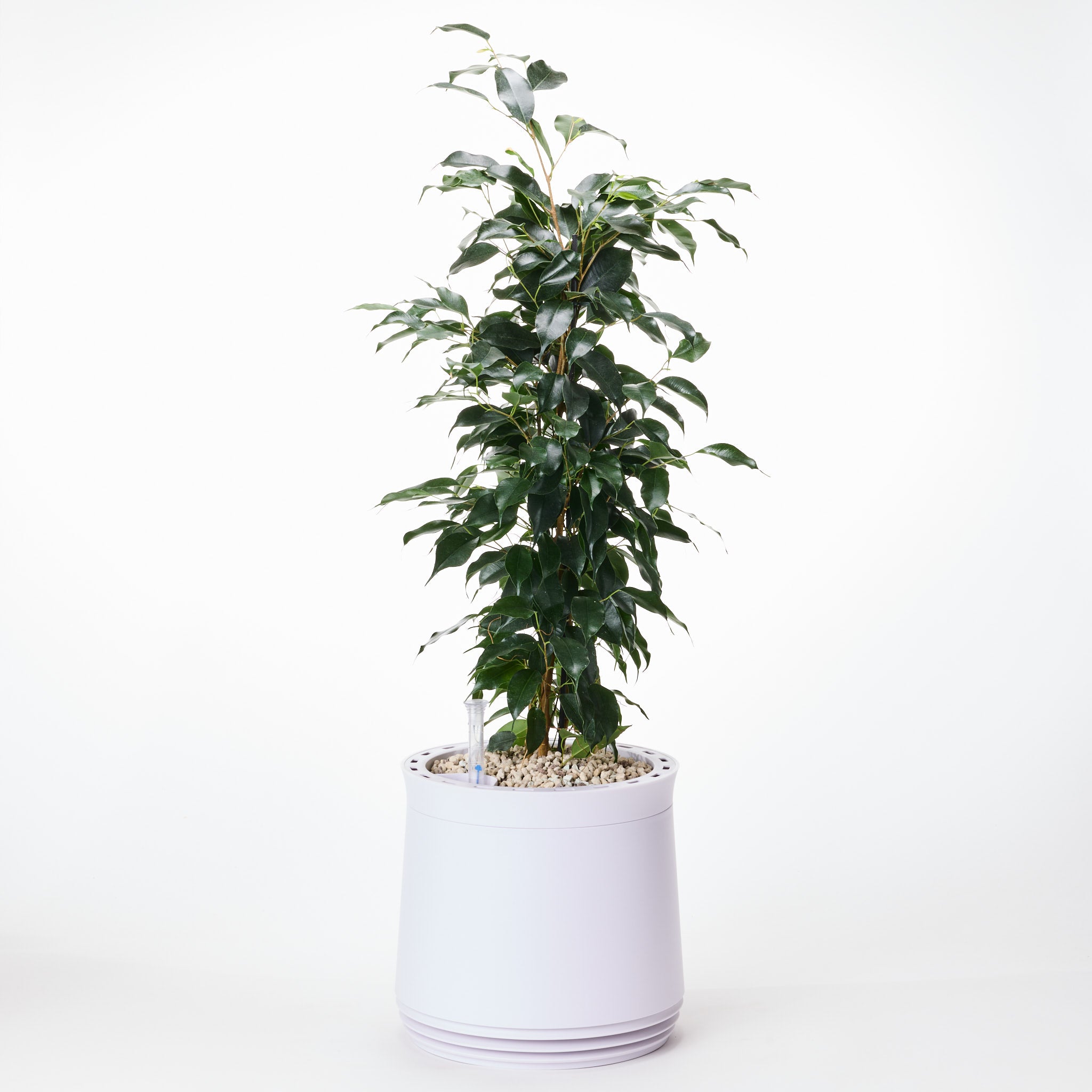
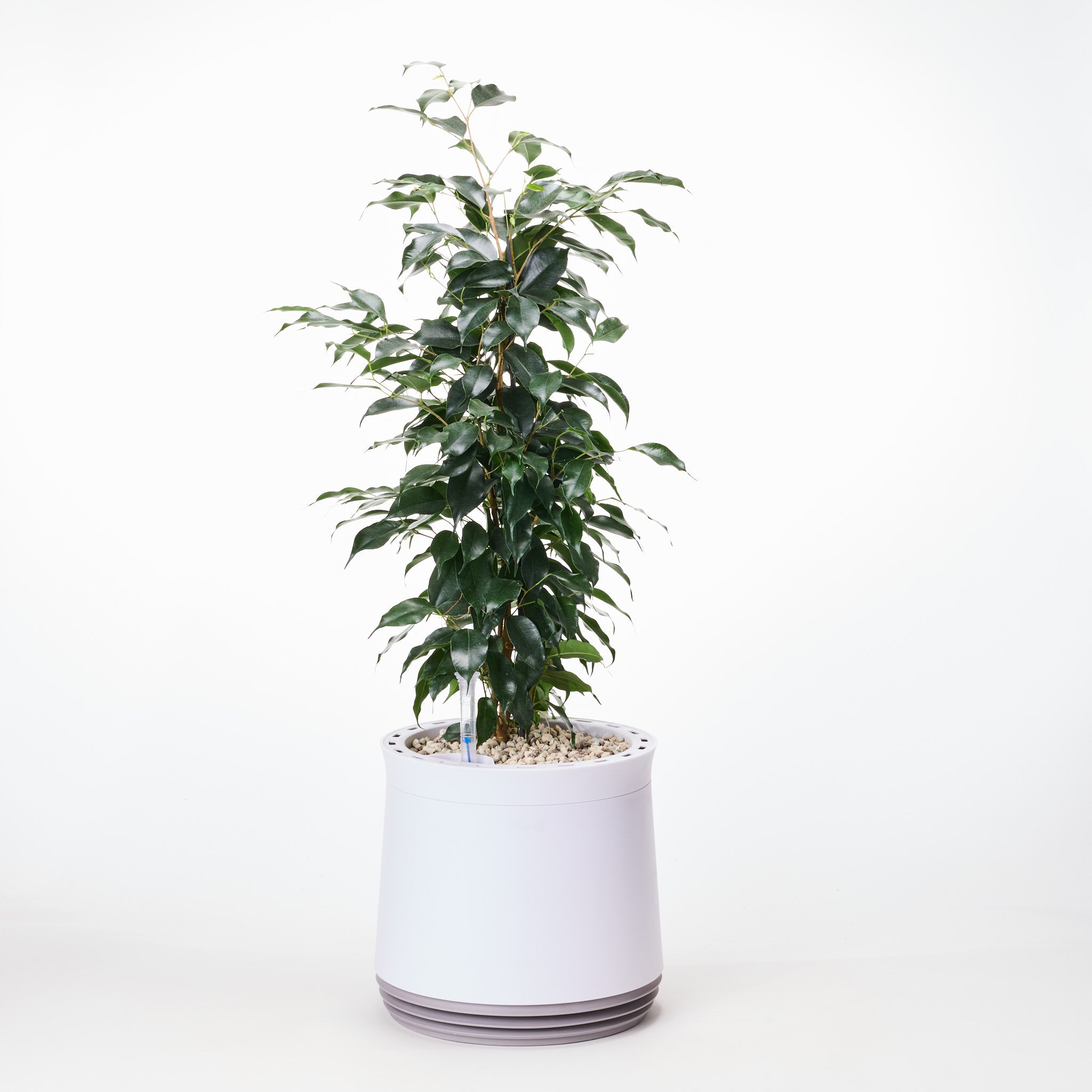
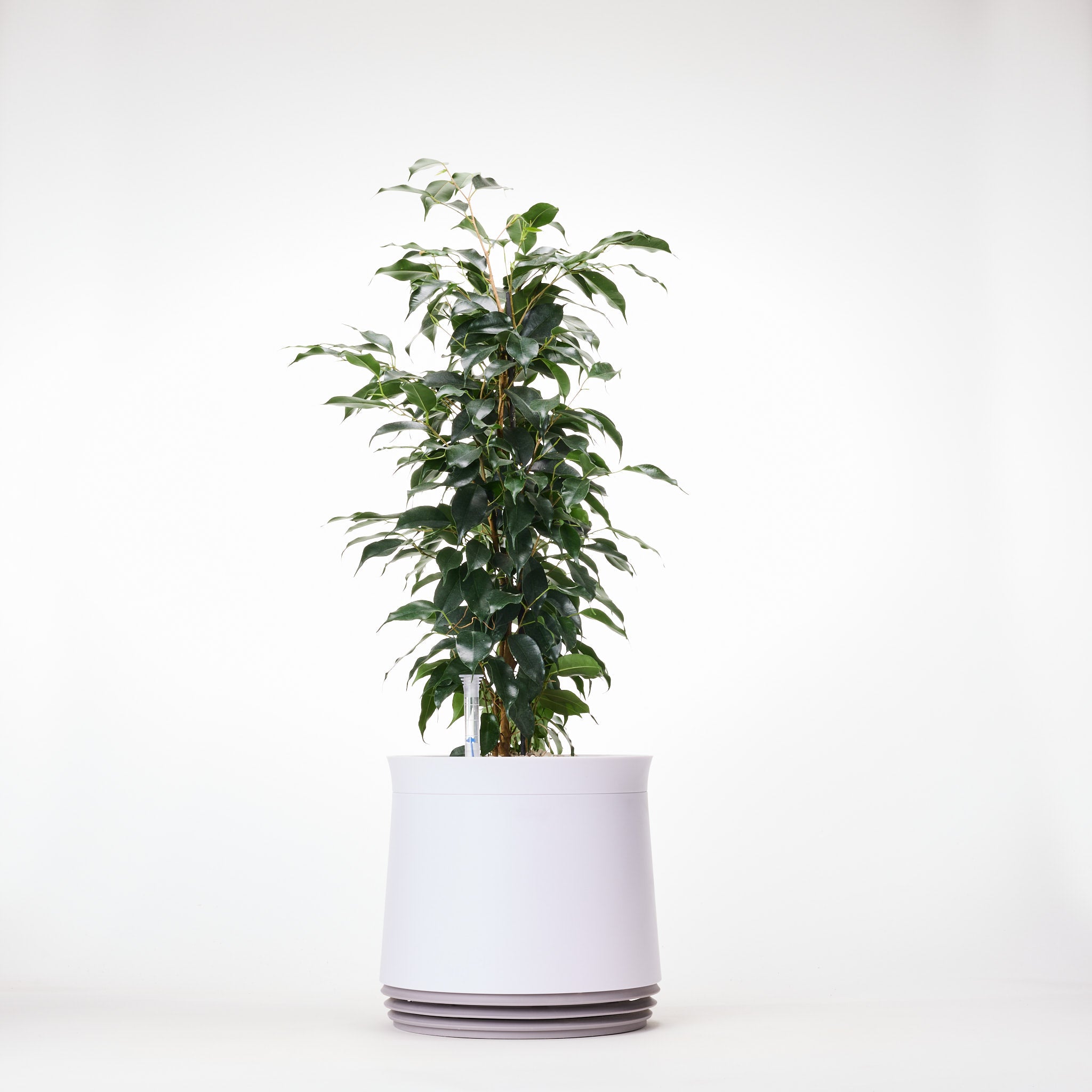
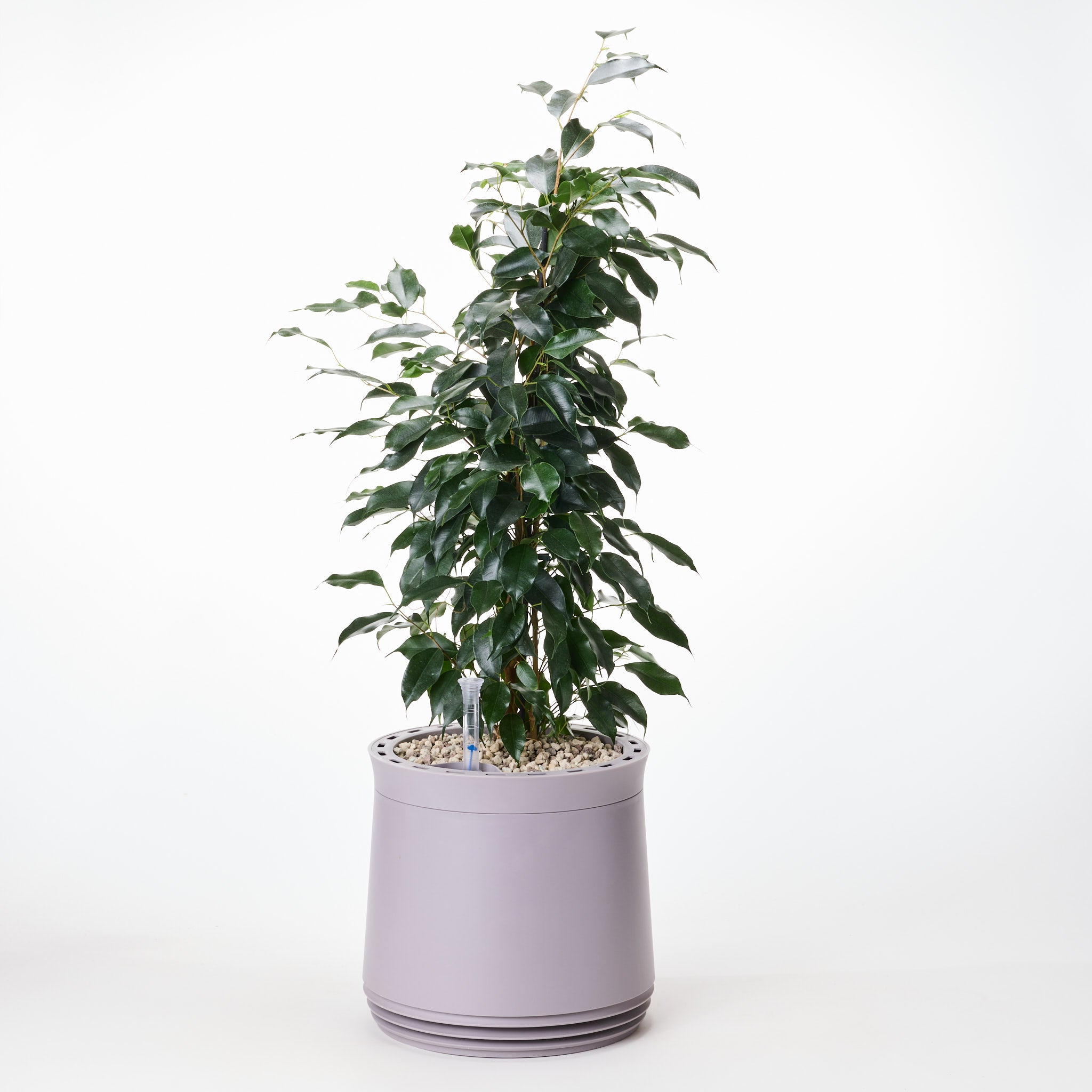
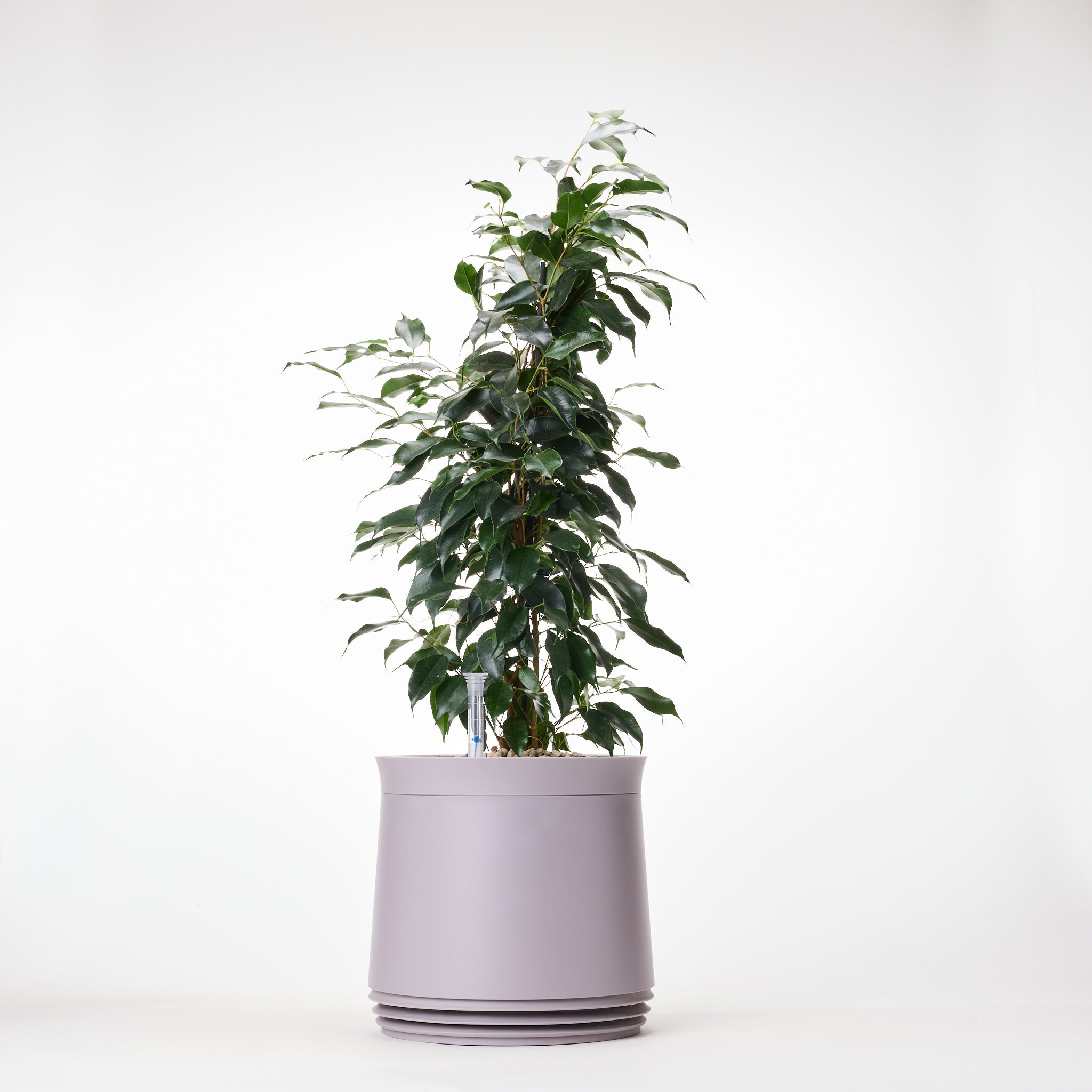
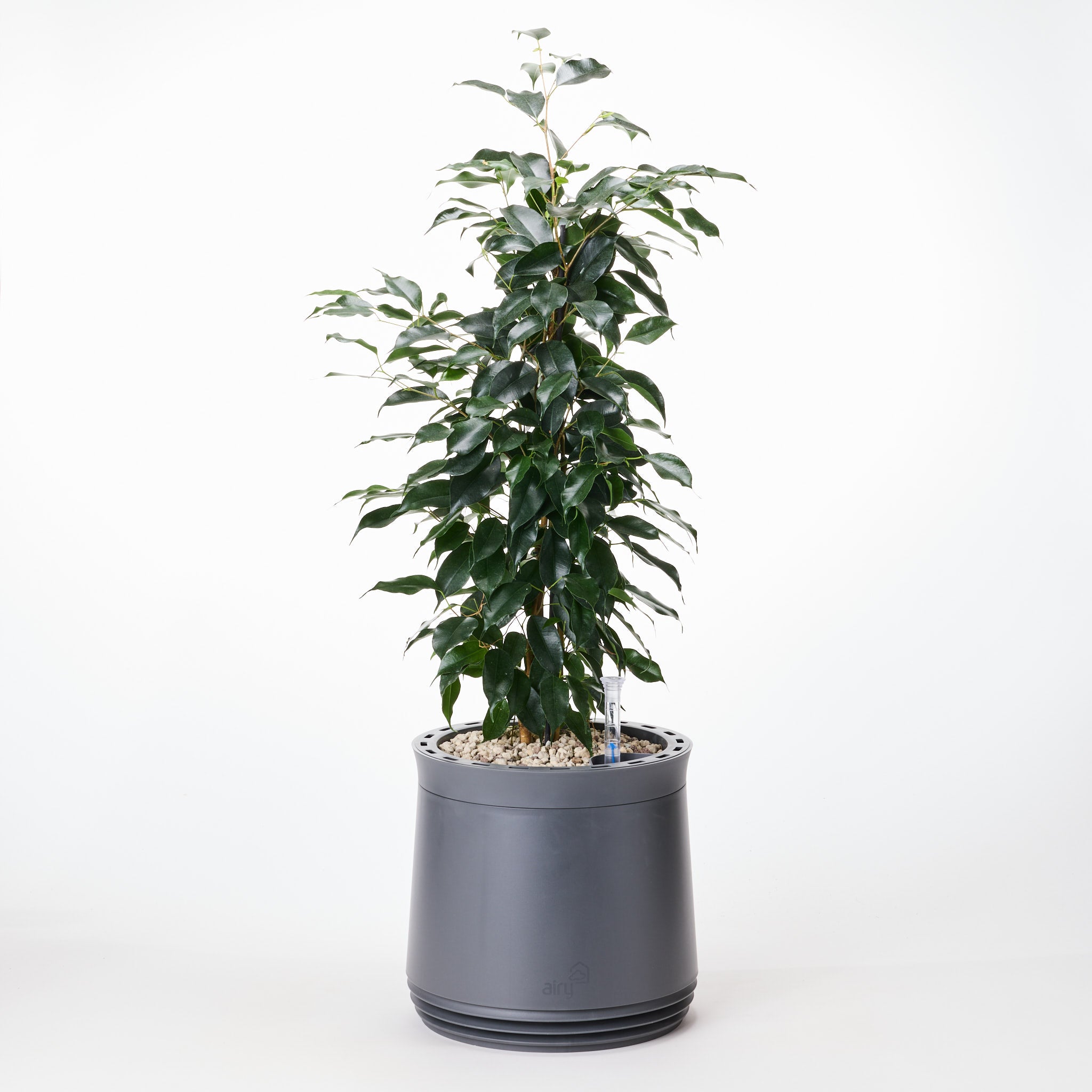
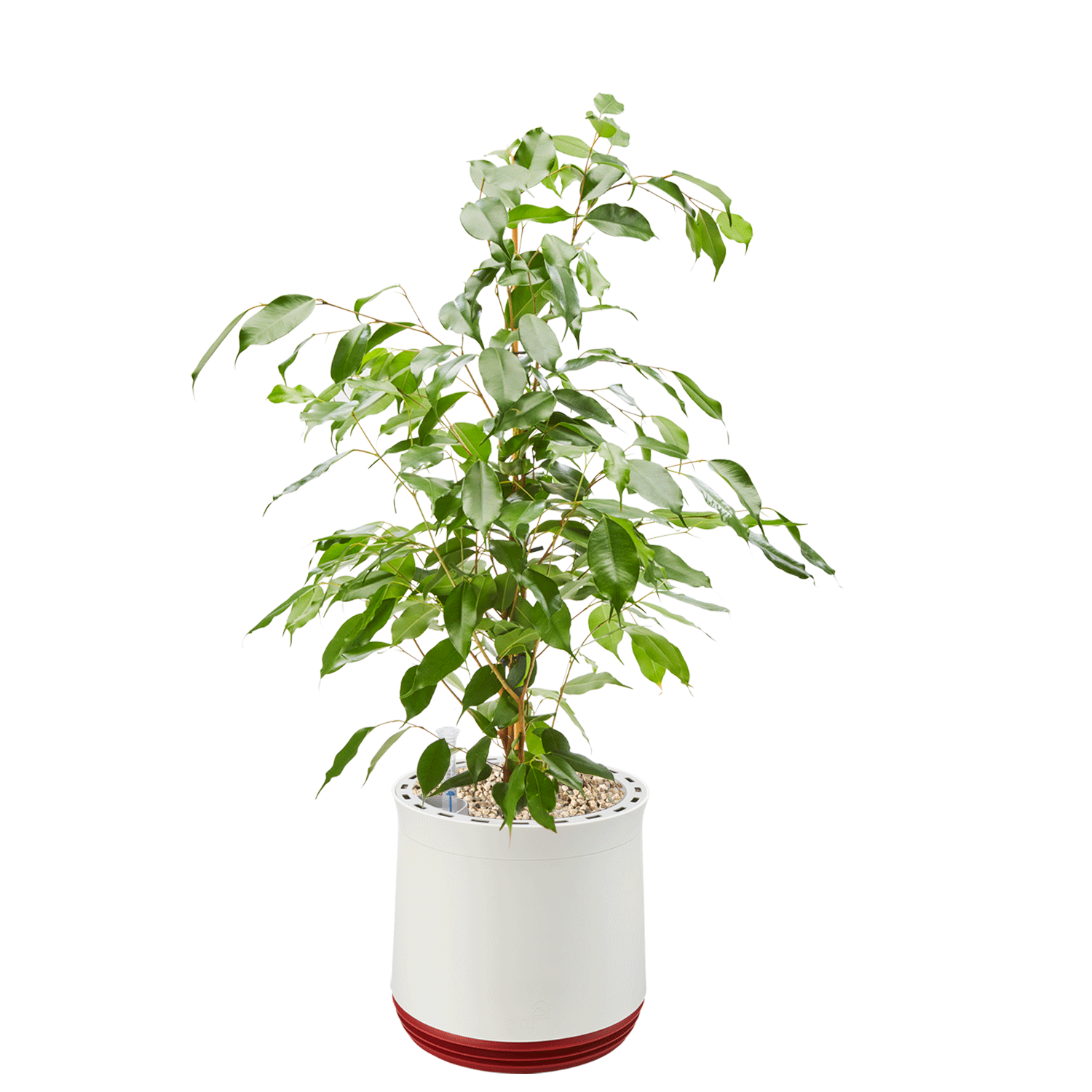
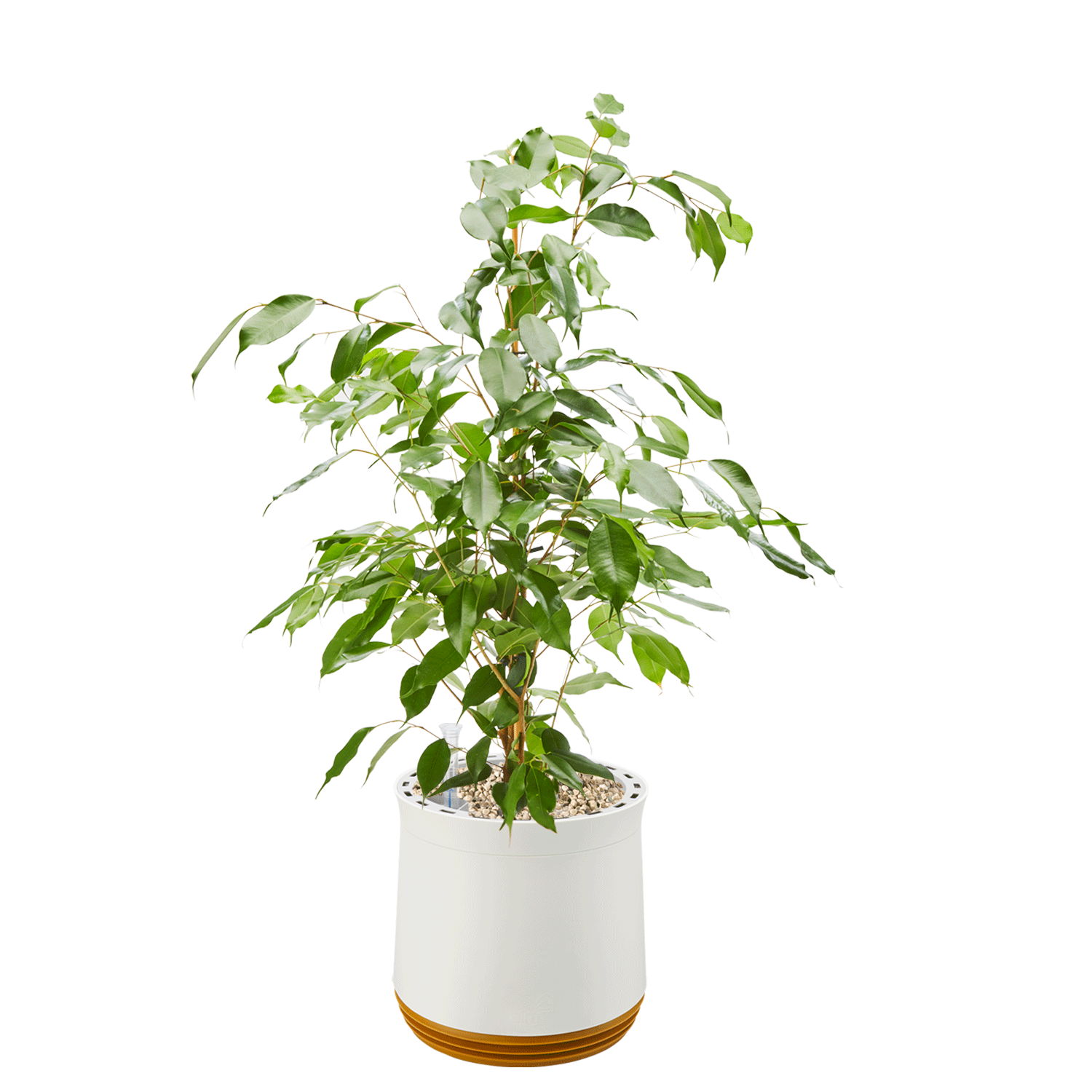
AIRY System M with weeping fig
Within Germany Shipping costs are staggered according to weight, delivery time approx. 1-3 working days:
0kg-13kg: 5.90€
14kg-22kg: 9.90€
23kg-31kg: 14.90€
32kg-41kg: 19,90€
42kg-55kg: 24.90€
56kg-69kg: 29,90€
70kg-85kg: 34.90€
86kg-101kg: 39,90€
102kg-117kg: 44.90€
118kg-133kg: 49,90€
134kg-149kg: 59,90€
150kg & more: 79,90€
There is no minimum order value.
Color
Passend dazu:
The AIRY System M ensures healthier indoor air day and night without having to supply electricity or change filters. Living room toxins in the air are removed reliably and without leaving any residue thanks to the patented ventilation technology of the plant roots. The AIRY System M effortlessly exchanges and cleans the air in rooms of up to 20 square meters within 24 hours . At the same time, the water tank and plant ensure a naturally healthy indoor climate. Ideal for larger spaces such as cupboards, sideboards and floors.
Our plants are a natural product. Sizes, colors and number of sheets may vary. Dimensions given are approximate dimensions. Plant origin:
Southeast Asia, Oceania and Australia
Light & location:
Bright to partial shade, moderate sunlight
Room recommendation:
- Office & living room (focus on easy-care plants)
- Bathroom and kitchen (focus on easy-care plants)
Water requirements without AIRY:
- Evenly moist once a week
- Avoid waterlogging
Water requirements with AIRY:
- Water requirements vary depending on light, temperature and season
- Filled water tank up to “max” supplies plants for approx. 2-3 weeks
- Water level indicator shows individual water requirements
Care recommendation:
- Fertilizer: In the growth phase from March to September, e.g. AIRY Booster
- Tonic: 1x per week in spring and summer, one measuring spoon of AIRY Vitalizer per liter with the irrigation water
Air purification:
Eliminates the air pollutants formaldehyde, xylenes and toluene
Pet friendly:
No
Particularities:
- Rotate regularly for symmetrical growth
- Lime tolerant
AIRY M:
- Dimensions: approx. 27x28 cm (HxW)
- Empty weight approx. 2 kg
- Water tank with approx. 1.6 L
- water level indicator
- 100% recyclable thermoplastic
AIRY Weeping Fig:
- Plant height including growing pot approx. 75 cm (+/- 10 cm)
- Root ball diameter approx. 17 cm
- German traditional gardening
AIRY substrate:
- 1 x 6-liter bag
- Consists of pumice, lava and zeolite
We usually ship one business day after your order. As soon as we hand over your order to our shipping partner DHL, you will receive a link for tracking the shipment by email. The delivery time is therefore 2-3 business days.
If you order a complete AIRY system, you usually receive the pot, mineral substrate, and plant in one package.
The shipping costs are within Germany tiered according to weight:
- 0kg-13kg: €5.90
- 14kg-22kg: €9.90
- 23kg-31kg: €14.90
- 32kg-41kg: €19.90
- 42kg-55kg: €24.90
- 56kg-69kg: €29.90
- 70kg-85kg: €34.90
- 86kg-101kg: €39.90
- 102kg-117kg: €44.90
- 118kg-133kg: €49.90
- 134kg-149kg: €59.90
- 150kg & more: €79.90
The specific costs for your order will be shown to you at checkout.
Known for









Questions? Get advice!
Frequently asked questions
Air
Air is our most important food. Statistically speaking, we consume 350,000 kilograms of air over the course of our lives. This is ten times more than food (35,000 kg) and five times more than liquid (70,000 kg). Source: Austria Federal Ministry of Agriculture, Forestry, Environment and Water Management
Especially volatile organic compounds (VOC) such as formaldehyde, toluene or benzene. They are contained in building materials, furniture or technical devices and evaporate continuously over years. Fine dust (from printers and copiers) also plays a role.
Nope. Technical systems are (very) expensive to purchase and require ongoing measures and investments (energy, maintenance, filter changes). Since these are filter systems, the pollutants are only collected. Fresh air is not produced - unlike plants.
Space
The number of plants required depends on the size of the room, the level of pollutants and the sensitivity of the people who live there. The rule of thumb is: an AIRY system in size S is sufficient for rooms up to 10 square meters, sizes M and L for up to 20 and 30 square meters respectively.
According to the WHO, indoor air is up to 30 times more contaminated with pollutants than outdoor air. Since people now spend around 90% of their time indoors, the effects are immense: the first symptoms of poisoning are mood disorders such as headaches and fatigue. Science speaks of the “Toxic Home Effect” or “Sick Building Syndrome”.
Ventilation helps against CO2 pollution in the air - but that is only part of the problem. In particular, pollutants from furniture, carpets, paints, varnishes and cleaning products evaporate and accumulate in the indoor air (so-called VOCs, volatile organic substances). Fine dust, caused for example by road traffic, can also penetrate into the interior through ventilation and pollute the indoor air. The AIRY biofilter collects all these pollutants - and is constantly cleaned by the plant roots.
plant
Yes. Without plants, life on planet Earth would not be possible. NASA has therefore researched how plants can be used to purify the air in space. She examined 30 different plant species for their air-purifying properties. The result: There are certain plants that, over the course of evolution, have specialized in feeding themselves “from the air”. These plants mainly come from dry, hot regions and are ideal for cleaning indoor air.
Plants absorb air through their leaves as part of photosynthesis. They transport the pollutants they contain to the roots. There the pollutants (especially VOCs) are broken down into their basic chemical components (amino acid, starch, glucose) by plant enzymes and microorganisms. Means: The pollutant is converted into nutrients for the plant without leaving any residue. As part of the NASA study mentioned, plants were completely ventilated (including the roots). If the leaves were removed, the plant's performance only decreased slightly (5-12%). This led to the conclusion that only ventilation of the root system enabled the plants to achieve their full potential.
The AIRY Base consists of lava, pumice and zeolite rock. This power mixture developed by scientists significantly expands the effectiveness of the AIRY. The fine-pored stones promote root aeration thanks to their coarse grain size. In addition, they absorb an extremely large amount of water, which they gradually release to the plant roots. Odors and pollutants also get caught in the fine-pored structure thanks to the air supply from below. The capillary effect ensures the continuous absorption and residue-free release of pollutants from the substrate to the roots. This means that the rock does not become clogged. Unlike industrial filters or activated carbon filters, the substrate never needs to be replaced.
Hydroponics is a system in which plants grow without soil. In such systems there are no microorganisms, but they are essential for the growth of plants. The absence of these organisms can cause plants to rot and produce harmful bacteria. This can lead to health problems for us humans indoors.
Person
Hydroponics is a system in which plants grow without soil. In such systems there are no microorganisms, but they are essential for the growth of plants. The absence of these organisms can cause plants to rot and produce harmful bacteria. This can lead to health problems for us humans indoors.
The proverbial “thick air” indoors has a variety of consequences:
- Mood disorders (headache, fatigue, mood swings, poor concentration, loss of appetite, nausea, sleep disorders)
- Irritation of the respiratory tract and eyes
- Allergies and hypersensitivitiesThe proverbial “thick air” indoors has a variety of consequences:
That depends on the plant growing in the AIRY. Scientific research has identified about 30 plants that are particularly effective against airborne environmental toxins. These are typically so-called “air roots” from the rainforest or desert plants. These plants are able to metabolize volatile organic compounds (VOCs) such as formaldehyde, benzene or toluene.
The AIRY system
We use the “chimney effect”: differences in temperature and pressure as well as air movements in the room ensure that air at the bottom of the pot gets into the inside and can rise between the inner pot and the outer wall and leave the pot again.
Never. The pollutants are removed without leaving any residue, so there is no “landfill on the windowsill”. In addition, the annoying repotting is no longer necessary: Due to the nature of the inner pot, the water-bearing roots stop growing (“air pruning”), leaving significantly more space for the nutrient-absorbing hair roots. This promotes the rapid and healthy growth of the plant.
An AIRY system consists of three components: pot, substrate and plant. In order to offer easy care and the best possible guarantee of success, we have developed our own mineral substrate. It offers the plant an ideal home.
Only light and water are required for ongoing operation. Both depend on the plant. The pot's water tank ensures pleasant maintenance intervals. Experience has shown that the system needs more water in the first few weeks until the humidity in the room has regulated.
The pot systems are manufactured on our behalf by a medium-sized injection molding company in North Rhine-Westphalia.
We developed the mineral substrate together with the Klanz company. Pumice and lava are mined in the Eifel, the zeolite comes from Slovakia.
We source the plants directly from Holland. They are quality tested by the “Orchideen Wichmann” nursery in Celle (Lower Saxony) and sent to our customers from there.
Yes, several times. Recently, the Fraunhofer Institute has carried out extensive studies using various pollutants (xylene, toluene) as examples. Compared to a plant in a conventional pot, the AIRY system was many times more powerful. The studies are available here: https://airy.green/pages/funktionweise
-
Fast shipping
-
30-day money-back guarantee
-
NASA confirmed effectiveness
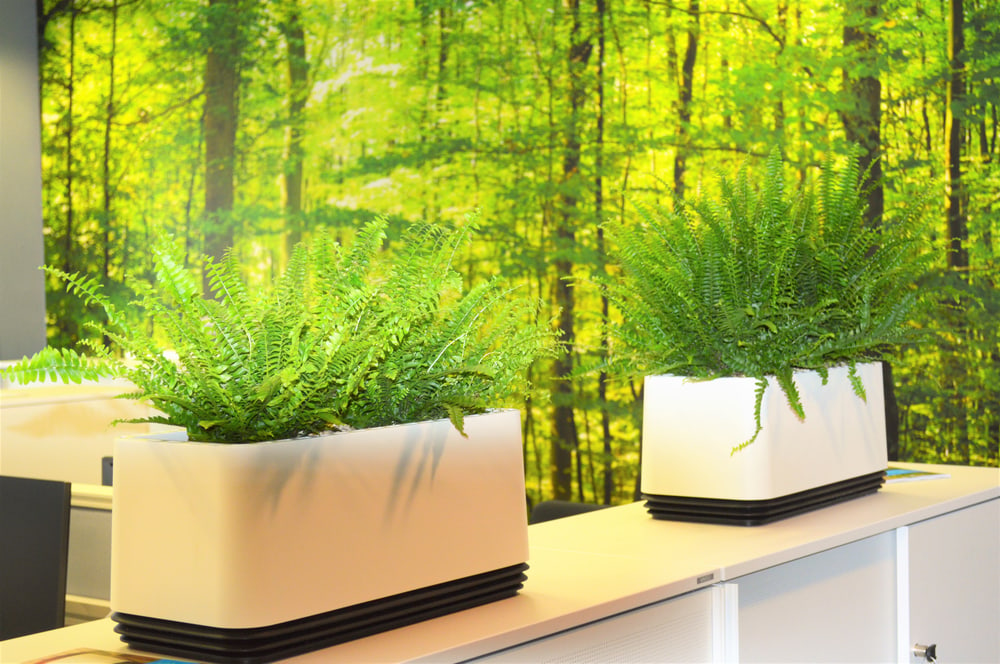
AIRY RENT
The best office plants for a fresh working environment. More productivity and well-being through indoor greening with AIRY systems.

